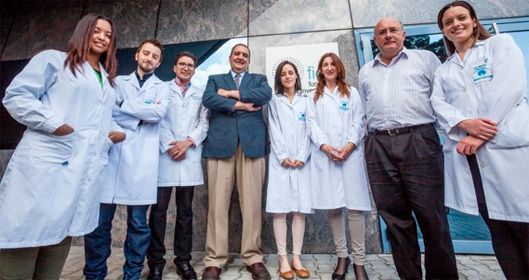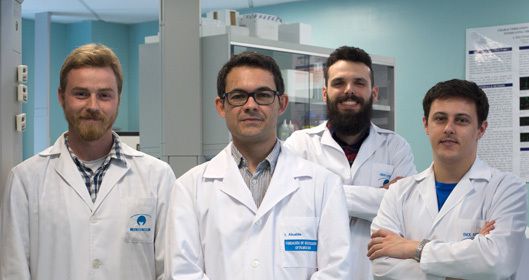Inicio / Ocular Surface Unit
Postdoctoral researchers: Dr. Ignacio Alcalde
Pre-doctoral researchers: D. Federico Bech, D. Omar González
Laboratory Technicians: D. Enol Artime, ADN. Paola Braga

The Research Group on Neural Surface Degeneration and Regeneration (NeuroSurface) is dedicated to basic research on some of the unresolved problems of ocular neuroscience. The integrity and transparency of the cornea depend to a great extent on the correct functioning of the cornea`s nervous system. Injuries to corneal nerve contributions produce functional alterations on the ocular surface and directly affect the transparency and integrity of corneal tissues, including the formation of ulcers and perforations. Nerves are involved in the processes of inflammation in the cornea and are the foundation of neuropathic pain, which points to them as the main foundation for the health of the ocular surface. Despite their importance, the cellular and molecular processes responsible for their functioning are still little known.

The nervous component of the cornea is extremely complex and exquisitely sensitive. The cornea has about 200 times more sensitive endings than the fingertip or 50 times more than the dental pulp. This profuse network of nerve receptors is an excellent alarm system for the eye against external aggressions and changes in the microenvironment of the ocular surface. It also plays an important role in the maintenance of epithelial homeostasis by basal mechanisms and regulated reflexes at the neural level.
The group’s research line focuses on the study of dystrophies and nerve lesions that affect ocular surface homeostasis and regeneration processes. We study the molecular and cellular mechanisms involved in the degeneration of the cornea´s nerve fibres, associated, for example, with aging and that cause ocular complaints such as dry eye.
This increasingly prevalent disease causes alterations of vision, inflammation, pain and discomfort and significantly decreases the patient’s quality of life. We also investigate the processes necessary for correct nerve regeneration in massive nerve injury models of the central cornea, and design regenerative and neuroprotective strategies.
We also work to discover the molecular mechanisms underlying axon degeneration of peripheral neurons that innervate the cornea-related neurodegenerative diseases, as they may be early indicators of neurological disease.
The general objective of the research group is the study of the degenerative processes that affect sensory innervation of the cornea, its importance in ocular surface disease and regeneration and neuroprotection mechanisms.
We can divide axonal degeneration triggers in the cornea according to their origin: endogenous and exogenous.
Specialties: Cataracts Presbyopia Glaucoma Myopia
